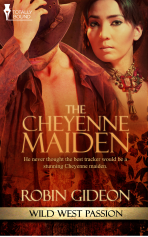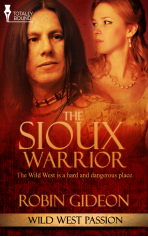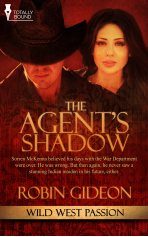Sorren McKenna looked down at the pinpricks of light that shone through the windows of the town below. He knew that familiar clutching sensation in his stomach and shifted his weight in the saddle. Something inside him was warning him not to go into the town of God’s Grace. The package from the War Department wouldn’t carry good news. It never had.
He thought once again of simply turning his horse around and returning to his ranch where there was a warm fireplace and smooth brandy. He had worked hard to create a new future for himself, and he was loath to see it dismantled by his former superiors in Washington.
“Damn me,” he muttered, angry at his indecision.
It occurred to him that he shouldn’t be afraid. Sorren McKenna had survived Quantrill assassination squads, countless fights with guns and knives, and many other skirmishes that had caused blood to be spilled and men to die. Sorren’s exploits during the War Between the States had taught him to survive, no matter the cost.
The war had been ugly, and it was something Sorren preferred to forget. The blind hatred the fighting had spawned shocked Sorren. Most shocking of all, at least for Sorren, was that he had become such a critical part of it. As a spy behind the Rebel lines, he had been part of the very worst deception and treachery. He had learned that he couldn’t prevent the fighting, but he told himself that his work could speed its end. He did not realise until it was too late that his past—and the nightmares—would follow him, leading him, circuitously, to where he was now, looking down at the small valley town of God’s Grace.
He lightly tapped the mare’s ribs with his heels. Sorren headed for Angie’s Saloon. At this time of the night, the package would be waiting at Angie’s instead of at the stagecoach station.
* * * *
Minutes later, Sorren slipped off his mare and dropped the reins to the ground. He didn’t need to tie her to the hitching post. Sorren had trained her to remain in place if her reins hung to the ground. Training horses was one of four things Sorren was extremely good at.
Pushing through the batwing doors, Sorren entered the familiar confines of Angie’s Saloon. Four customers were in the back, seated around a table, playing cards. The rest of the tables were empty. Frankie, the bartender, was cleaning glasses behind the bar. He appeared worried.
“Well, hello there, Mr. McKenna.”
“Frankie.” Sorren nodded a greeting to the bald-headed, red-nosed man, then turned his attention to the card players in the back. Judging from the size of the pot, they were playing stud poker for small change. A waste of his time, Sorren concluded.
The men were also drunk. They were fresh off the range, rank from it, with too much dust in their throats, too little money in their pockets for their labour, and too much steam to let off in too little time. It was a bad combination, and Sorren knew it.
“Frankie, there’s supposed to be a package here for me.”
“Yes, sir, Mr. McKenna. Got it right here.” Frankie reached under the bar and produced a large leather envelope. It was thick and heavy, bound with leather straps, and sealed shut with wax. “I ain’t never seen a package quite like this one before. What kind of thing is that?” he asked, pointing to the red wax with the seal of the War Department in it.
“It’s nothing very interesting, Frankie.”
“Sure thing, Mr. McKenna,” Frankie said quickly. Years of watching humanity from behind a bar showed in his expression. “Whatever you say.”
Sorren took the envelope and squeezed it. Curiosity made him want to break the seal to inspect the contents, but he felt it best to open it with Catherine and Carl Weatherly. He didn’t trust them like he trusted their father, and Sorren knew they didn’t trust him.
Sorren reached into the front pocket of his black trousers and took out a gold coin. He snapped it on the bar in front of Frankie and said, “Buy a drink on me. Thanks for your time.”
“Thank you, Mr. McKenna. Don’t you want a drink or somethin’? It’s on the house. Aw, hell. It’s on me.”
Sorren had tipped him the equivalent of one week’s salary.
“Not the cheap stuff, neither. I’ll give you some of Miss Angie’s private stock.”
“Thanks anyway, Frankie, but I’ve really got to get back.”
Behind him, Sorren heard the scrape of a chair, and the lusty cackle of four men in unison. He glanced up from his package and into the mirror that ran the length of the bar. The woman he saw was the most breathtakingly beautiful, self-possessed creature he’d ever seen in his life. He faced her, unwilling to study her through the reflection in the mirror. She stood just inside the batwing doors, her head moving slowly as she took in everyone in the saloon. Her gaze met Sorren’s, held his briefly, then moved on.
She dressed like a woman of her tribe, but she was of mixed blood. Tall for a woman, she had rather broad shoulders, an extravagantly full bosom, and legs that were full, firm, and tapered. Her doeskin dress, Sorren noticed, had been slit up both sides so she could straddle a horse’s back.
“Damn,” Sorren whispered. To Frankie he said, very quietly, “I think I’ll have a whiskey. Scotch, if you’ve got it.”
Around her waist was a plain leather belt, handmade, and fixed to it was a sheath carrying a bone-handled knife. The woman’s waist-length hair was held away from her face with a single leather thong tied around her forehead.
“Looky what we got here, boys! A pretty little squaw. Hey, honey, you ain’t working at Beth Ann’s now, are you? Come on over here and let ol’ Joey show you what life’s all about.”
Sorren’s desire to keep his distance from Joey and the other three was in conflict with his concern for the young woman. He tried to guess the half-breed’s age. Eighteen? Maybe a year or two older? It was hard to tell. As she walked toward the bar, Sorren saw how her breasts rose and fell, moving inside the soft dress.
“Hey, damn it, I’m talking to you,” Joey said in a voice just below a shout. “Squaw, don’t you walk away from me.”
She kept walking, moving away from Joey and toward Frankie. Her right hand rested lightly on the hilt of the knife at her hip.
“What in hell is this? What’s this, boys? Does this squaw think she’s too good for me? Huh? Is that what you think, squaw?” Joey started for the object of his fascination. His eyes were red-rimmed from alcohol and lack of sleep. He smelled of a month on the prairie. “Hey, damn it, I’m talking to you.”
The normally slow fuse of Sorren’s anger had been lit by Joey’s rage. Surprisingly, since he really hadn’t planned on making the woman’s fight his own, the moment she was past Sorren, he stepped away from the bar, moving between her and the oncoming Joey.
“I don’t think she’s interested,” Sorren said, his voice low, even. He used the voice of a man accustomed to giving orders that did not have to be shouted to carry authority—a man whose orders were followed. He smiled at Joey, but the smile was cold, without humor. “But I wouldn’t worry too much about it. There are a lot of the kind of woman you’re looking for in God’s Grace. Maybe you should try your luck at Beth Ann’s.”
Joey had been drinking, but he wasn’t drunk enough to let another man trespass in his affairs. At least not without a fight. Sorren had seen his type before. Too many times. Through the fog of lust and whiskey and contempt for the world around him, the man glared at Sorren and something shone through. He smiled crookedly and a thin trickle of spittle tainted with chewing tobacco juice ran from the corner of his mouth to his chin.
“Well, I’ll be hanged. If it ain’t the high and mighty Sorren McKenna.” Joey pushed his sweat-stained, wide-brimmed hat back on his head with the tip of one finger. The Indian with the leather dress was forgotten for the moment. “What are you doing in Angie’s at this time of the night, McKenna?”
Sorren said nothing. He tried to see in his mind’s eye what Joey would look like without the whiskers. The voice was familiar, but not the face. Because of the size of his ranch, Sorren had hired many drifters and cowpunchers over the past several years. Most of the cowboys Sorren hired on a seasonal basis were all pretty much the same—hard-working, hard-drinking men trying to get a grubstake together as they made their way west to the Promised Land.
Sorren had been as far west as San Francisco. He no longer believed in a Promised Land—at least not on this earth.
Joey’s jaw worked a moment, then he spat a perfect stream of tobacco juice between Sorren’s black, highly polished boots. When he looked up, hatred glittered plainly in his eyes. He had his left thumb hooked into the gun belt around his waist. His right hand hung forebodingly close to the revolver’s handle.
“You don’t even remember me, do you, you son of a bitch?”
“No.” Sorren didn’t particularly care for lying. He’d done a great deal of it in his life already. He wouldn’t do more of it for a man like Joey.
Sorren was a few feet from the bar. It was utterly absurd for him to even consider the possibility of Joey being faster at the draw than he was, but he knew that looks weren’t everything. Sorren hadn’t lived as long as he had by being careless, by underestimating another man’s ability. More than one grave had been filled by a seemingly drunk, sloppily dressed cowpuncher who knew how to handle a Colt.
“You son of a bitch,” Joey repeated, shaking his head slowly. He sent another stream of tobacco juice flying, though it was aimed to the side this time. “You mess with a man’s life and you don’t even remember his face? Somebody oughta teach you to respect a guy like me.”
Sorren forced himself to appear to be perfectly unconcerned. He stood with his feet apart, his hands hanging limply at his sides. The flat-crowned, flat-brimmed black hat was pulled low.
Sorren was less concerned about the cowpuncher in front of him than he was about the three others who were fanning out behind Joey. They slowly moved away from each other, making it impossible for Sorren to attack all of them simultaneously. One would not be hit by a stray bullet intended for another. They had done this before, Sorren decided. They were pack wolves accustomed to fighting together against a single enemy. He knew what would have happened to the Indian girl had Joey gotten hold of her. They probably would have taken her right on the sawdust-strewn floor. The justice system protected Indians, but only if it wasn’t too inconvenient.
Where was she? Sorren realized with equal helpings of bitterness and admiration that after she had started this mess, she had disappeared, seemingly melting into the night.
Smart girl.
Somehow Sorren had always known that when he died, it would be because of a woman, probably one he didn’t even know.
“If you hadn’t fired me, I’d be at Beth Ann’s right now,” Joey began. He seemed to be sizing up Sorren and wondering what chance he had in a fair draw, and how far his friends would go to back him up in a gunfight. “But you up and fired me, Mister McKenna.” He drawled the word out slowly, contemptuously. “Now I ain’t got no job and no money. Can’t even buy myself a woman. An’ that’s all ’cause of you, McKenna.”
Now, vaguely, the memory of Joey was coming back. Sorren hadn’t even bothered firing Joey himself, delegating that particular responsibility to his ranch foreman. He remembered something about a man who drank too much, especially during the daylight hours, and who complained all the time. Sorren understood now why Joey was dangerous. He was poison, and he’d poison everyone around him.


















